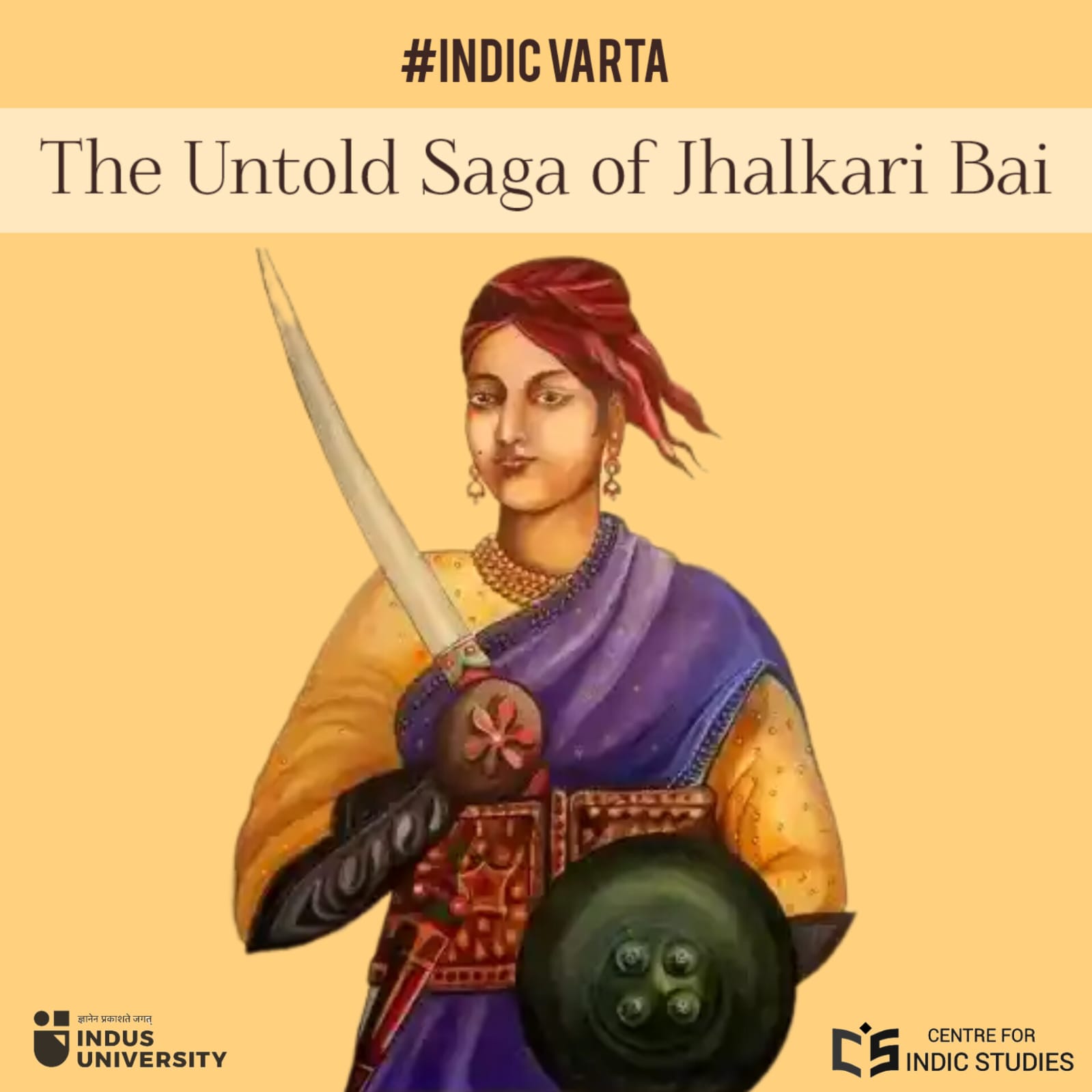- Visitor:58
- Published on: 2024-11-09 02:27 pm
The Untold Saga of Jhalkari Bai: Defender of Punya Bhoomi Bharat
While history often focuses on a select few individuals, and Rani Lakshmibai is justifiably honoured as one of India's greatest freedom fighters, it is equally important to recount the inspiring tale of her confidant and fellow warrior, Jhalkari Bai.

Bharatvarsha has long been revered as Punya Bhoomi. This greatness is not solely due to the profound spiritual and cultural heritage embedded in its Dharma, but also because of the countless acts of valour and sacrifice made by its defenders over millennia. The greatness of this nation lies in the selflessness of its warriors—those who stood tall to protect Dharma and the motherland, often in the face of overwhelming odds and personal tragedy.
Throughout history, warrior ancestors of this nation have faced foreign invasions, aggressions, and internal upheavals, yet they never faltered in their duty. From the Mauryan empire repelling Greek invaders to the valour of Marathas and Rajputs against Mughal dominance, and finally, to the countless freedom fighters who stood up to British colonial rule, India’s history is punctuated by acts of supreme sacrifice. If one were to attempt to chronicle each act of heroism, the list would span innumerable pages, yet failing to capture fully the magnitude of the sacrifice that has safeguarded this sacred land through time. What sets these men and women apart is their unwavering devotion to a higher cause—the nation and its Dharma. They did not seek greatness for themselves or act out of a desire to be remembered in history. Instead, they embraced the idea of Karma Yoga, performing their duty for the sake of the greater good, without attachment to the outcome. Their courage was fueled by love for their motherland, a force so powerful that it transcended the need for personal recognition. These warriors cherished martyrdom, but not for glory. In fact, many of them were content to remain anonymous in the pages of history.
The idea that personal fame and recognition should not be the motivation behind action resonates deeply within the Indian ethos. As Sri Aurobindo once proclaimed: “There are times in a nation’s history when Providence places before it one work, one aim, to which everything else, however high and noble in itself, has to be sacrificed. Such a time has now arrived for our motherland when nothing is dearer than her service, when everything else is to be directed to that end. If you will study, study for her sake; train yourselves body and mind and soul for her service. You will earn your living that you may live for her sake. You will go abroad to foreign lands that you may bring back knowledge with which you may do service to her. Work that she may prosper. Suffer that she may rejoice. All is contained in that one single advice.” [1]
This sentiment, cherished in the Indian psyche, emphasises the importance of contributing to something far greater than individual ambition. It reflects a humility that permeates the nation’s spirit—where supreme sacrifice is a matter of duty, not personal pride. These warriors performed their Dharma, their righteous duty, without the need for adulation. Their motivation came from an inner call to defend the nation and its values, no matter the personal price.
History often has a unique way of summoning extraordinary individuals in times of national crisis, as if fate itself beckons them to rise and defend their motherland. Sometimes, destiny works in ways that more than one great soul emerges in the same time period, forming a powerful alliance that alters the course of the nation’s destiny.
Such was the case during the turbulent times of 1857, the year of India's First War of Independence. As the country erupted in revolt against British colonial rule, a remarkable convergence of brave souls took place. Among the most celebrated figures was Rani Lakshmibai of Jhansi, who became a symbol of resistance. But alongside her stood another fearless woman, Jhalkari Bai, whose contribution, though less well-known, is crucial to the narrative of India’s freedom struggle.
The article explores the story and legacy of Jhalkari Bai, a brave and selfless warrior who stood by the side of Rani Lakshmibai of Jhansi during one of India’s most critical historical moments, the 1857 revolt against British rule. While history often focuses on a select few individuals, and Rani Lakshmibai is justifiably honoured as one of India's greatest freedom fighters, it is equally important to recount the inspiring tale of her confidant and fellow warrior, Jhalkari Bai.
The Warrior’s Early Life
Born into a humble family in Bhojla village near Jhansi in 1830, Jhalkari Bai’s upbringing was far from royal, yet she displayed the same warrior spirit as her queen. From an early age, Jhalkari Bai showed signs of exceptional bravery. She mastered horse riding and weaponry, skills uncommon for women in general. She was also trained in archery, wrestling, and shooting, learning much from her husband, Puran Kori, who served as a soldier in the army of Raja Gangadhar Rao, the King of Jhansi and worthy consort of Rani Lakshmibai.
In India, one does not tend to compartmentalise domestic and national life. Contributing to the national cause is very much a part of domestic obligation. In this view, taking care of one’s family is seen as a way of nurturing the nation, and serving the country is considered an extension of fulfilling household duties. Being a married woman did not restrict Jhalkari Bai to her household responsibilities. Along with her domestic duties, she felt it was her duty to serve her nation at the time of crisis. There was no conflict whatsoever.
Here it becomes pertinent to mention that throughout Indian history, women have embraced the idea that their duty (Dharma) extends beyond the home, rising to the occasion during times of crisis. They did so without hesitation, embodying the belief that protecting the family and the nation are complementary, and equally vital, responsibilities. This perspective not only empowered women to engage in the freedom struggle but also redefined the concept of patriotism, showing that national service is not limited to men on the battlefield, but encompasses the collective strength of society, including its women.
Jhalkari Bai’s early acts of bravery and military prowess soon earned her a place as a soldier in Rani Lakshmibai’s army. It wasn’t long before her fearlessness and loyalty elevated her to one of the queen’s most trusted advisors. Jhalkari Bai's intelligence and strategic acumen saw her play a critical role in military decisions, and she became an integral part of the Durga Dal, the women’s regiment of the army. While her deeds on the battlefield are known to some, what is less acknowledged is her contribution to planning and strategizing alongside the queen herself.
The Battle of 1857: An Act of Supreme Sacrifice
During the First War of Indian Independence in 1857, Jhalkari Bai’s moment of glory came when the British, led by Field Marshal Hugh Rose, laid siege to Jhansi. The queen’s forces, although strong in spirit, were eventually betrayed by a commander from within, leading to a British victory at the fort. Rani Lakshmibai was advised by her generals to escape and fight another day, but a diversion was needed to ensure her safe retreat.
This is where Jhalkari Bai stepped into history with an unparalleled act of courage. It is said that Jhalkari Bai bore a striking resemblance to Rani Lakshmibai. She donned the queen’s armour and rode into battle, posing as the queen herself. With no regard for her own life, she fought valiantly, allowing the real Rani to slip away undetected. For an entire day, she misled the British forces, confusing them into believing that they had cornered the queen.
Her act of bravery and deception bought Rani Lakshmibai crucial time to plan her next move, ensuring the survival of the rebellion. Jhalkari Bai fought fiercely, killing several British soldiers before she was captured and eventually killed.
Legacy of the Forgotten Heroine
Although Jhalkari Bai sacrificed her life on the battlefield, and ultimately her Queen whom she defended and sought to protect, Rani Lakshmibai, also lost her life; the revolt of 1857, despite being suppressed and failing to yield immediate results, emerged as a powerful symbol of resistance. This uprising served as a blazing example and a source of inspiration for future generations of freedom fighters in their struggle against colonial rule. The bravery and sacrifice displayed during this tumultuous period ignited a fervour for independence that would continue to resonate in the hearts of those who followed, reminding them of the enduring spirit of courage in the face of oppression.
The revolt left behind a blueprint for future revolutionaries. This was profoundly examined and highlighted by Vinyak Damodar Savarkar in his magnum opus, The First War of Independence of 1857. In this seminal work, Savarkar meticulously detailed the motivations, strategies, and sacrifices of the freedom fighters, presenting a comprehensive analysis of the uprising's significance and laying out a roadmap for the freedom movement. Savarkar encouraged later freedom fighters to recreate that spirit of rebellion within the British Indian Army, which could ultimately dismantle the loyalty of Indian soldiers to their British commanders. The loyalty of Indian soldiers to their British commanders was essential to maintaining colonial rule, and a shift in this loyalty could spell disaster for the Raj. He believed that if Indian soldiers could be inspired to rise against their colonial oppressors, the very foundation of British power in India would be undermined. Without the support of Indian troops, the foundations of the Raj would inevitably collapse.
Savarkar’s book, The First War of Independence of 1857 became a rallying cry, motivating young Indians to take up the mantle of resistance, organise themselves, and build a cohesive front against colonialism. As fate would have it, nearly a century after Jhalkari Bai’s sacrifice on the battlefield, another significant uprising occurred in 1946 in the Royal Indian Navy. This revolt soon spread to the British Indian Army, the Royal Indian Air Force, and the Indian Imperial Police. Starting from its flashpoint in Bombay, the rebellion garnered support across British India, extending from Karachi to Calcutta. It ultimately involved over 10,000 sailors across more than 70 ships and shore establishments. The visionary ideas of leaders like Veer Savarkar came to fruition as the loyalty of Indian soldiers and policemen towards their British superiors was undermined. This shift in allegiance left the British in no position to continue their colonial establishment in India. This was effectively the Last War of India’s Independence, leading to the eventual expulsion of the British from Indian soil.
Jhalkari Bai's sacrifice may have initially seemed momentarily in vain and insignificant, but as history unfolded, her contributions became evident. Although her role may seem minor in the larger chain of events, it was, in fact, the collective effort of countless individuals like her that fueled and sustained the flames of resistance against colonial oppression.
It is unfortunate that despite her act of supreme sacrifice, she eventually faded into anonymity and obscurity, overshadowed by the more prominent figures recorded in history. But one needs to understand that the history of Bharatvarsha is not just the story of kings, queens, and empires, but of countless men and women who, without seeking recognition or reward, gave their lives to protect their motherland.
Jhalkari Bai's story, like many other unsung heroes of Bharatvarsha, reflects the true spirit of selfless sacrifice. In Jhalkari Bai’s courage, we see the essence of Punya Bhoomi, where heroes rise from the soil of the land, guided not by the pursuit of glory but by the call of duty—protecting Dharma and Bharatvarsha.
Work Cited:
[1] Aurobindo, Sri. Appeared as: Advice to National College Students Speech on 23 August 1907; published in The Complete Works of Sri Aurobindo. Bande Mataram Vols. 6,7 (2002 ed., pp. 656-657). Sri Aurobindo Ashram Publication Department.
Further References:
Subramanian, A. (2017, April 21). Jhalkari Bai: The Untold Story of The Other Jhansi ki Rani. The Better India. Retrieved on 26 October 2024, https://thebetterindia.com/97013/jhalkari-bai-laxmibai-jhansi-india-freedom/
Majumdar, R. C. History of the Freedom Movement in India, vol. 3. Firma KLM, 2024.
- 29 min read
- 0
- 0










